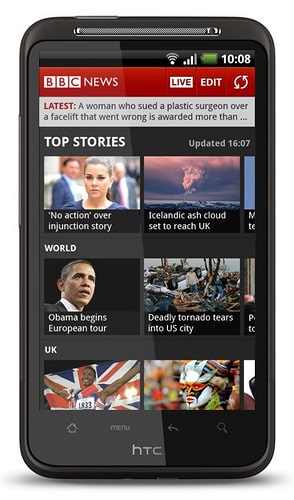
*Time* between launching on iOS and Android? Ten months, in BBC News’ case.
The broadcaster, with all its resources, has only today debuted its news app on Android Market.
It joins the many content proprietors who are late to embrace what is now the most-used smartphone operating system. CNN recently added its Android app to its iOS equivalent.
As a free-to-air publisher, it’s not as if the BBC can use the logic commonly cited by many commercial peers, who say they are reluctant to join Android because they believe Android users are less prone to buy mobile content.
Media proprietors are still mad-keen on iOS and have only lately begun to get aboard Android. For some proprietors, it’s a case of cost (so much has been spent on iOS, there’s little left in reserve) and misunderstanding (many can’t tell a Froyo from an Ice Cream Sandwich), one developer of several publishers’ apps tells me.
But this situation is not even. Elsewhere in the BBC, its iPlayer app launched simultaneously on both of the major OS platforms in February.
Indicative of the differences within the Android ecosystem, this BBC News is not out there for Honeycomb-based tablets.
“We’ll be working with manufacturers to look at ways of re-versioning the service in the most efficient way,” writes BBC Future Media executive product manager Anthony Sullivan.
This Android launch may help blunt the many unofficial Android apps which repackage BBC News RSS feeds without authorisation, some of which are paid apps. Like the iOS version, this Android app really only scratches the surface of what’s available on the BBC News website, omitting several sections from the mobile version.
Some BBC News mobile stats…
- The iOS version has clocked three million UK downloads and a further three million internationally.
- Osama Bin Laden’s death brought a spike – 78 percent more mobile web users on the day, and 57,000 iOS downloads with 540,000 UK users in the week.